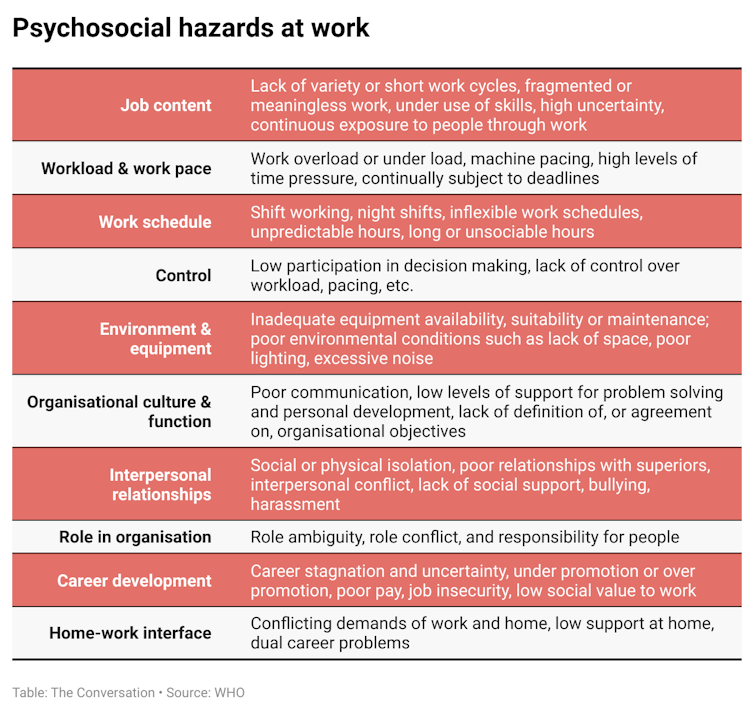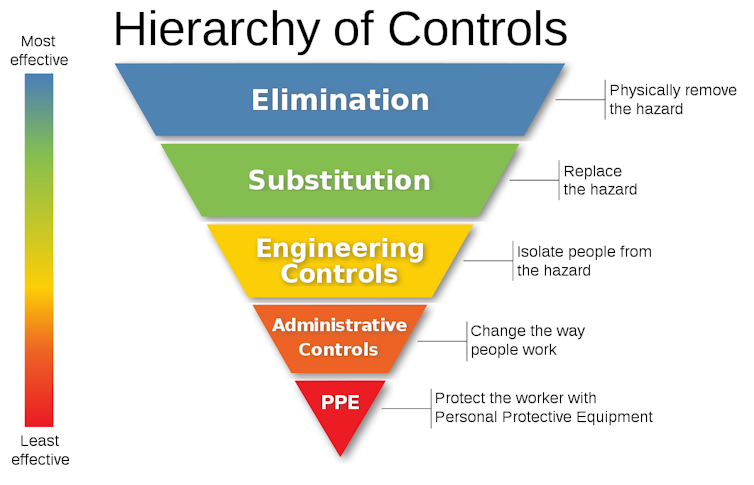Why insecure work is finally being recognised as a health hazard for some Australians

Alexis Vassiley, Edith Cowan University
About 3 million Australian workers lack job security. An estimated 2.4 million – 20% to 25% of the total workforce – are casual workers, with no paid leave entitlements. A further 500,000 are on fixed-term contracts.
Whether you are labourer engaged by a labour hire company, a checkout operator, a ride-share driver or a university lecturer on a casual contract, job insecurity can harm both your physical and mental health.
In an Australian first, Western Australia has formally recognised this in its new Code of Practice on Psychosocial Hazards in the Workplace, which provides practical guidance on how WA workplaces can comply with their duties under the state’s Occupational Safety and Health Act 1984
A psychosocial hazard refers to any social and organisational factor with the potential to cause psychological or physical harm. In terms of work, it’s anything in the design or management of work that can cause stress.
Better recognition of such hazards was recommended in 2018 by the Boland Review into the “model” laws, regulations and codes that underpin uniformity between Australia’s state and territory work health and safety regimes.
Australia’s federal, state and territory ministers agreed to this recommendation in May 2021. Since then, most states and territories have updated their regulations or compliance codes.
Western Australia is the only one so far to include insecure work. It’s a step in the right direction. For real progress, though, all states and territories need to follow suit – and then follow up with laws to safeguard more secure work.
What are psychosocial hazards at work?
The World Health Organization lists ten psychosocial hazards at work. These cover issues including high uncertainty in job content, lack of control, lack of support and job uncertainty.
Exposure to such hazards over a prolonged time increases the risk of acute and severe mental or physical injury.

As noted in our centre’s submission to the WA government – in which we recommended including insecure work in the new code – most of the ten hazards listed above go hand in hand with insecure work.
For example, hazard number three – work schedule, including unpredictable hours – applies to the majority of Australia’s casual workers, with 53% having work hours (and thus income) that fluctuate from one pay cycle to the next.
Job insecurity exacerbates the hazards that also affect those in permanent employment, such as work load (hazard 1), lack of control over work (hazard 4) and lack of career opportunities (hazard 10).
Worse health and safety outcomes
A growing body of research shows insecure work is a health hazard.
Two of Australia’s leading experts in this field, Michael Quinlan at UNSW Sydney and Elsa Underhill at Deakin University, have told the current Senate inquiry into job security there are three major negative outcomes:
higher incidence/frequency of injuries, including fatalities
poorer physical and mental health (such as from bullying)
poorer knowledge of, and access to, employment rights and less willingness to raise concerns.
Fear of losing work is a powerful disincentive against complaining or using rights available to them. For example, a 2021 survey of 1,540 workers by the Australian Council of Trade Unions found:
40% of all insecure workers said they had worked while unwell because they didn’t have access to paid leave
67% of those who worked through an ailment, rather than taking time off, said they feared taking leave would affect their job (compared with 55% of permanent workers)
50% of those who were sexually harassed took no action because they feared negative consequences (compared with 32% of permanent workers)
Are codes of practice legally enforceable?
Codes of practice are part of the three-tier framework regulating employers’ obligations to maintain a safe workplace.
At the top is legislation, which broadly defines responsibilities, then regulations, then codes of practice. These codes are practical guides for industries and businesses on how to achieve the standards required under the laws and regulations.
Codes do not have the same legal force as a regulation, but can still be used by courts to assess if an organisation has taken the “reasonable steps” required by law to ensure a safe workplace.
Some codes relate to specific types of work or hazards, such as handling dangerous chemicals. The new WA code on psychosocial hazards applies to all workplaces.
From recognition to change
Including insecure work in WA’s code is unlikely to change much in the short term.
In theory it should mean organisations employing casual or contract workers undertake a risk-assessment process, then implement controls to manage those risks.
There is a hierarchy of risk controls in work health and safety protocols.

At the top is eliminating the risk. This would see employers convert as many employees to permanent status.
Lower down the hierarchy is reducing the risk. This could be done by giving casual workers as much notice of shifts as possible, ensuring more predictability with their schedule and more stability with their income, or higher pay rates to partly make up for some of these hazards.
Will these things happen? Probably not. In practice, codes of practice alone don’t bring change. Provisions providing a pathway for casual or fixed-term employees to permanent status, for example, already exist in many enterprise agreements, but employers often find ways to avoid honouring them.
Real change will require legislative reform or an increase in union strength.
Some countries in Europe, for example, now have laws limiting the numbers of temporary agency workers and those on fixed term contracts. Such laws also need to be backed up by enforcement mechanisms – notably vastly increased resources for regulators.
The WA government’s new code of practice represents an important first step within Australia’s industrial relations landscape. Formal recognition of insecure work as a health hazard should act as spur to further reform.
Insecure work is widespread. We know what’s wrong with it. It’s time to do more about it.![]()
Alexis Vassiley, Research Associate, Centre for Work and Wellbeing, Edith Cowan University
This article is republished from The Conversation under a Creative Commons license. Read the original article.
Jobs Just For You, The Safety Professional
Our weekly or daily email bulletins are guaranteed to contain only fresh employment opportunities
Latest Jobs
WHS Project Officer - Contract
Southern Sydney, New South Wales, Australia
Injury Management Advisor - Contract
Kangaroo Point, Queensland, Australia
WHS Project Manager - Contract
Sydney, New South Wales, Australia
Senior Health, Safety and Wellbeing Advisor - Contract
Logan City, Queensland, Australia